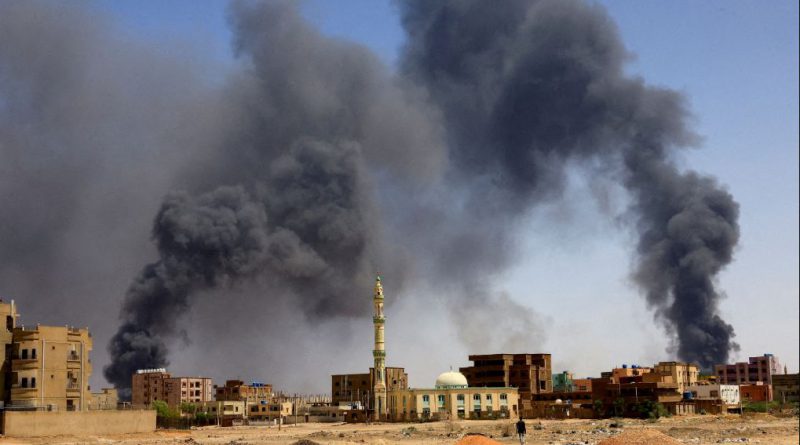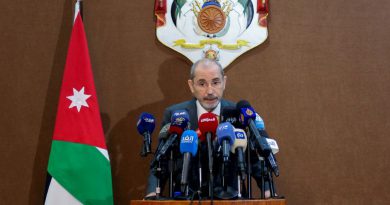Sudan slides further into war as diplomacy flounders
Cairo (Reuters) – Shooting their way through truces, Sudan’s warring factions have shown the limited leverage the United States, Saudi Arabia and other foreign powers have in ending a two-month conflict that is driving the nation deeper into disaster.
Neither the army nor the paramilitary Rapid Response Forces (RSF) seem far enough backed into a corner to take ceasefire talks in Jeddah seriously, which diplomats partly blame on rival regional powers aligning with different sides.
Bringing more regional players to support talks, such as Egypt, which sees the army as the best bet for a stable neighbour, and the United Arab Emirates, which has backed the RSF leader in the past, may be key to progress, one U.S. official said.
For now, after almost two months of war, Africa’s third biggest nation and its 49 million people – close to 2 million of whom have already fled their homes – is hurtling towards a deeper humanitarian crisis with its own farms at risk of failing and aid unable to reach all those in need after swathes of the capital and the west of Sudan became a war zone.
“Nobody will negotiate in earnest until they feel that the military balance is not moveable any more,” said Rift Valley Institute analyst Magdi El Gizouli. “The internal dynamic of this war is a bit beyond what an external actor can really influence”.
After the latest 24-hour truce expired on Sunday, residents in Khartoum and capital area reported fresh artillery fire and clashes. They said fighting had intensified since early June.
The United States and Saudi Arabia, which lies across the Red Sea from Sudan, have sponsored talks in the Saudi port city of Jeddah. But every temporary truce has been violated so far, even though both sides say they are committed to negotiations and despite U.S. sanctions.
Diplomats with knowledge of the talks say the Jeddah process was faltering partly because key players were absent, including Egypt, which also has a general-turned-politician at its helm, and the UAE, which has ties to RSF commander Mohamed Hamdan Dagalo, known as Hemedti.
A senior U.S. State Department official told reporters existing parties to the talks had considered broader participation, adding that Cairo and Abu Dhabi “do have specific leverage that could be helpful.”
A Cairo-based diplomat said a new African Union-led forum aimed to bind Arab and African states into the process, including Egypt and the UAE, though it was unclear that either country was ready to exert real pressure.
Adding to the overlapping peace initiatives, Kenya’s president said on Tuesday that another African grouping within the forum, IGAD, intended to meet Hemedti and army chief Abdel Fattah al-Burhan in the next 10 days in a bid to stop the war.
Mohamed Mokhtar, a senior advisor to Hemedti, said the RSF supported the Jeddah and AU processes, and that these should be expanded to civilian parties in order to reach a “comprehensive solution”.
Burhan could not be part of any future authority in Sudan, Mokhtar told Reuters, and Hemedti, who he said was with his forces on the battlefield, would not have a political role but would continue to lead the RSF.
The army did not immediately respond to questions.
Khartoum Alone
The war threatens to tear the Sudanese state apart and convulse the region four years after the popular uprising that toppled Omar al-Bashir brought hopes of democratic change following decades of autocracy, sanctions and civil conflict.
Fighting that erupted from tensions over a plan for a transition to civilian rule has ripped through Khartoum and its adjoining cities of Omdurman and Bahri, as well as hitting the conflict-scarred western region of Darfur, North Kordofan state and other areas.
On the ground in the capital, the absence of authorities is galling, residents said, adding to a sense that those who remain have been abandoned.
Diplomatic missions were evacuated shortly after the conflict erupted on April 15 and many senior Sudanese officials decamped from Khartoum to the more secure, army-controlled hub of Port Sudan on the Red Sea Coast.
“How can we and our families live through this war?” Mahasin Ibrahim, a 54-year-old teacher and resident of Khartoum told Reuters by phone. “There’s no one to complain to. The government, the ministers, the top officials have all disappeared.”
Unlike in previous conflicts warring sides are locked in battle in the heart of the capital. The RSF has seized control of most of the city, and the army’s use of air strikes and heavy artillery has done little to push it back, as fighting rages for control of the levers of the state and its military arsenal.
Residents of the capital already struggling with rampant looting and shortages of food, medicine and fuel say they have become more exposed to battles that have strayed into densely populated neighbourhoods as the war has progressed.
Exodus
The failure of talks has put the nation, which was already reliant on aid, in a perilous humanitarian state. Of the nearly 2 million who have fled, almost 500,000 have crossed to neighbouring states.
The death toll probably runs into thousands, although with authorities dispersed around the country and many hospitals closed, precise numbers are difficult to ascertain.
The U.S. State Department said on Tuesday that 2.5 million people were reached with assistance because of some compliance to ceasefires, although aid organisations have been struggling to deploy, partly because of tight controls imposed by the army in Port Sudan.
In areas of Darfur, access from the outside has become all but impossible, with news emerging from the city of El Geneina, where hundreds have been killed, only when people make it by foot across the border to Chad.
“If they keep fighting it out, the Sudanese state is collapsing. It could take generations to try to put back together,” said Alan Boswell, Horn of Africa Director for Crisis Group.
“It will be a massive migraine for Africa, the Middle East and Europe for a long time to come unless people get more serious about stopping this.”


